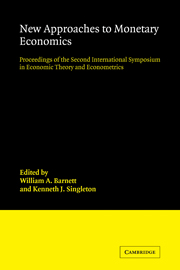 New Approaches to Monetary Economics
New Approaches to Monetary Economics Book contents
- Frontmatter
- Contents
- Editors' introduction
- List of contributors
- Part I Transactions motivated monetary holdings in general equilibrium
- 1 Monetary dynamics with proportional transaction costs and fixed payment periods
- 2 A multiple means-of-payment model
- 3 Credit policy and the price level in a cash-in-advance economy
- Part II Financial intermediation
- Part III Monetary aggregation theory
- Part IV Issues on aggregate fluctuations
- Part V Theoretical issues in the foundations of monetary economics and macroeconomics
3 - Credit policy and the price level in a cash-in-advance economy
Published online by Cambridge University Press: 04 August 2010
- Frontmatter
- Contents
- Editors' introduction
- List of contributors
- Part I Transactions motivated monetary holdings in general equilibrium
- 1 Monetary dynamics with proportional transaction costs and fixed payment periods
- 2 A multiple means-of-payment model
- 3 Credit policy and the price level in a cash-in-advance economy
- Part II Financial intermediation
- Part III Monetary aggregation theory
- Part IV Issues on aggregate fluctuations
- Part V Theoretical issues in the foundations of monetary economics and macroeconomics
Summary
This chapter considers the determination of interest rates and prices in a simple intertemporal general equilibrium framework. The resulting theory is used to examine the short- and long-run consequences of a policy of credit expansion through inside money creation.
The intertemporal equilibrium framework used here combines the demographic structure of an overlapping-generations model with a cash-in-advance constraint. The cash-in-advance constraint allows valued fiat money to co-exist in equilibrium with debt, yielding a positive nominal interest rate. The specific structure considered here allows a traditional account of the “liquidity effect” of open market operations upon the nominal interest rate in the short run to be rigorously connected with a longrun equilibrium analysis. The absence of such a theoretical connection has led to a certain amount of confusion in the literature about whether or not the liquidity effect of credit expansion, generally agreed to exist in the short run, can be maintained in the long run. It is shown that for the model economy considered here, open market operations can keep both the nominal and the real rate of interest low forever; and, whereas a lower interest rate is achieved in the short run only at the cost of a rise in the price level, in the long run different interest rates may be equally compatible with price-level stability.
- Type
- Chapter
- Information
- New Approaches to Monetary EconomicsProceedings of the Second International Symposium in Economic Theory and Econometrics, pp. 52 - 66Publisher: Cambridge University PressPrint publication year: 1987
- 3
- Cited by


